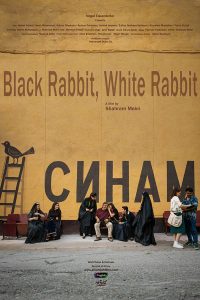
“Black Rabbit, White Rabbit”
(Tajikistan/UAE)
Screened at the 61st Chicago International Film Festival (International Competition) (North American Premiere) (3/5)
Letterboxd (3/5), Imdb.com (6/10), TMDB.com (6/10); Imdb.com critics review
#BrentMarchant #BlackRabbitWhiteRabbit #ChiFilmFest #Tajikistan #UAE #ShahramMokri #whatgoesaroundcomesaround #talkingobjects
I’m all in for inventiveness in filmmaking, especially in days like these, where it seems that endless sequels, reboots and franchise offerings have come to dominate the domestic movie industry. However, at the same time, that laudable sense of innovation needs to work, too, and, in the case of this latest feature from writer-director Shahram Mokri, that’s true but only to a certain extent. In what is undoubtedly one of the most unusual films I have seen in some time, the filmmaker plays with the concept of storytelling, presenting a project in which a domestic drama/thriller plays out amidst the efforts of a movie production company to make a picture of that same story, with reality and fantasy curiously overlapping and intertwining. That story involves three primary story threads that become interconnected as well, including one in which a woman severely injured in a mysterious car accident (Hasti Mohammai) has developed the ability to affect the performance of physical objects; one involving a movie prop master (Babak Karimi) who struggles with issues related to what he believes is a cursed stage revolver; and one in which an eager casting assistant (Kibriyo Dilyobova) desperately seeks an opportunity to make an on-screen appearance, despite strong objections from her boss/mother and an apparent lack of any appreciable talent of her own. These scenarios are further “enhanced” by the inclusion of surreal elements, such as the periodic appearance of human-sized rabbits that symbolically represent the characters and physical objects that appear to have the ability to move and silently communicate with one another. And, collectively, these qualities combine to deal with various narrative themes, most notably the notion of “what goes around comes around.” Admittedly, it’s all very intriguing for about an hour or so, but then the director seems to lose control of the room, allowing his considerable imagination to take over in ways that make the picture difficult to follow, a problem exacerbated by rapid-fire subtitles that barely give viewers enough time to read. To a great degree, this is all made worse by the film’s needlessly excessive length at 2:19:00, a runtime that could have (and should have) been easily scaled back and simplified for greater effect. There are also some unusual filming techniques employed here, such as protracted continuous takes, which don’t add much and that are employed inconsistently. Indeed, when a filmmaker has a wealth of creativity to draw from, it may be difficult for the director to rein himself in, as is the case here, which is regrettable, given that this tendency can undermine a project with real potential, again, as is the case here. “Black Rabbit, White Rabbit” is certainly to be commended for being an original and ambitious effort, but the finished product needs work to bring it down to a more manageable – and more coherent – level.

Babak Karimi portrays a movie prop master concerned about a cursed stage revolver in the surrealistic fantasy, “Black Rabbit, White Rabbit.” Photo by Nasrine Médard de Chardon, courtesy of Chicago International Film Festival.



